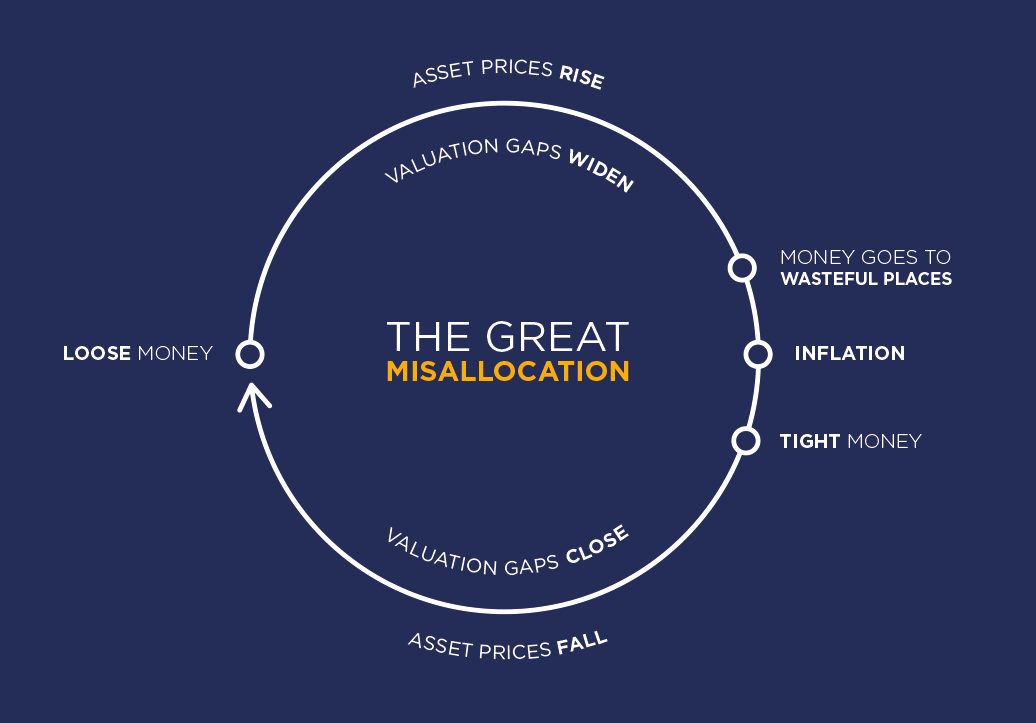Markets providing fertile hunting ground for stock pickers

Orbis
It has been almost exactly one year since we wrote about the sale of a digital yacht in the metaverse for $650,000 worth of cryptocurrency. It was an amusing anecdote that captured the essence of the Everything Bubble in late 2021, but those days are long gone. Today’s memorable crypto anecdotes are more likely to involve bankruptcy or fraud.
Every boom-bust cycle is different, but they all follow a similar pattern. An environment of loose money stimulates the economy and fuels rising asset prices. This is healthy—up to a point. But as the cycle matures, ever-rising asset prices can send distorted signals that increasingly lead to undisciplined capital allocation decisions.
To illustrate this, imagine you are managing a publicly traded business. When your company’s stock price is high, it is the market’s way of saying that it likes whatever you are doing. That’s where many money-losing tech companies found themselves in 2021. The market cheered them on as they invested aggressively in pursuit of growth rather than profitability.

Conversely, a low stock price can be a signal that the market doesn’t value what you are doing. This is where many energy and commodity producers have found themselves in recent years. Why bother investing in future production growth if the market isn’t going to reward your efforts?
For the economy as a whole, the result of these mixed signals has been what we call “The Great Misallocation”. We’ve ended up with surpluses of some goods and shortages of others—too many imaginary boats and not enough heat to get through winter. These imbalances—especially for things like energy, food and labour—have produced inflation, which requires a tightening cycle to correct.
This is where the cycle reverses. Money is taken away, asset prices fall, weak companies collapse, and fraudulent businesses get exposed as the bubble starts to burst. It’s a pattern we’ve seen before—notably in the late 1960s and late 1990s. But the current tightening phase has arguably been more painful since the Fed was much slower to act.
As painful as this may be for some businesses, it is an exciting tailwind for others. It is also exciting for bottom-up stockpickers. As dislocations begin to unwind and we start to see more rational pricing of assets, it should play to our strengths as bottom-up, fundamental analysts.
Indeed, the unwinding we’ve already seen thus far in 2022 has been a performance tailwind for many of the value-oriented shares held in the Orbis Strategies—and we think there is still a long way to go in both magnitude and duration.
INPEX, a Japanese oil and gas producer, is an example of a business that we continue to find attractive in the environment we see today. Trading at less than 9 times earnings, the company was one of the few in its industry to invest in liquified natural gas (LNG) over the last few years and is now well positioned in a world of energy shortages. As this cycle continues to unwind, we expect to see INPEX benefit from more rational oil and gas asset prices.
Beyond energy, there are a number of quality businesses across the economy that we find attractive—BMW, Bank of Ireland, Samsung Electronics, Jardine Matheson, and Toyota Motor, to name a few. They were all out of favour during the Everything Bubble—and continue to be underappreciated despite strong fundamentals. While it may be a tough time for markets, it may very well turn out to be a great time for stock pickers.
Different for good reason
The most lucrative ideas are often in unpopular or ignored areas. We have been confidently investing in unpopular or ignored stocks for over 30 years, unearthing companies trading for less than they are worth, rather than timing market trends. Find out more

Graeme joined Orbis in 1997 as an analyst, and has worked in the areas of risk management, quantitative analysis, and Australian equities. He holds a doctorate of Philosophy (University of Cambridge), and is a Chartered Financial Analyst
Expertise

Graeme joined Orbis in 1997 as an analyst, and has worked in the areas of risk management, quantitative analysis, and Australian equities. He holds a doctorate of Philosophy (University of Cambridge), and is a Chartered Financial Analyst
